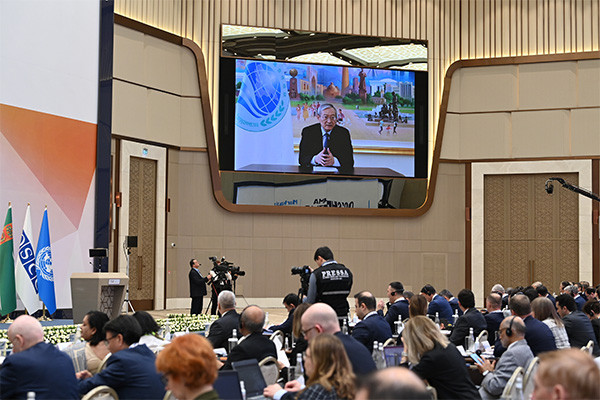
Uzbekistan proposes to convene the Youth Council of the countries of Central and South Asia in Samarkand
Tashkent, Uzbekistan (UzDaily.com) -- A high-level international conference has started in Tashkent on regional cooperation between the countries of Central Asia within the framework of the Joint Action Plan for the Implementation of the UN Global Counter-Terrorism Strategy.
The retrospective of interstate cooperation within the framework of this document shows that over 10 years of joint action, the countries of the region have formed quite effective national systems for countering terrorism, where important attention is paid to working with young people.
As you know, the relevance of the youth agenda in the fight against terrorism is due to the fact that today in the world the replenishment of the ranks of terrorists occurs mainly at the expense of the younger generation, who are most susceptible to harmful ideological influence.
Speaking of youth, it should be noted that during the international conference, the Head of our state Shavkat Mirziyoyev voiced a number of proposals for further expanding and filling the counter-terrorism cooperation between the countries of the region. In particular, it was proposed to launch the work of the permanent Youth Council of the countries of Central and South Asia in 2023 in Samarkand, designed to become an effective platform for the exchange of experience in creating favorable conditions for the self-realization of the young generation and the formation of a stable immunity to the ideas of extremism and terrorism.
In the context of the initiative put forward, Shavkat Mirziyoyev emphasized that the most important condition for successfully countering extremism and terrorism is an effective youth policy, because, on how the younger generation grows up, what kind of education and upbringing they receive, what conditions and "social lifts" will be created in the state, depends on the future of each state.
The importance of working with youth as one of the priority components of countering extremism and terrorism is noted in many international documents, including the UN Global Counter-Terrorism Strategy, as well as numerous reviews and reports on its implementation. They specifically emphasize the need for governments to take measures to: 1) employ, educate and train young people; 2) the creation of "feedback" mechanisms, with the help of which states listen to young people, interact with them and encourage their involvement in decision-making processes; 3) encouragement among young people of the ideas of peace, tolerance and intercultural, interreligious dialogue; 4) development of understanding of respect for human dignity, pluralism and diversity, including through educational programs and much more.
Today, more than half of the population of Uzbekistan is under 30 years old, so young people have been and will remain in the center of attention of our state. Over the past 5 years alone, a number of systemic measures have been taken in the country, and the legislative framework in the field of youth has been significantly improved. Thus, about 80 legislative acts have been adopted, including 5 laws, 23 decisions of the President of the Republic of Uzbekistan and about 30 documents of the Government aimed at solving the pressing problems of young people, creating the necessary conditions for their harmonious development and finding a worthy place in society.
Moreover, the recently adopted Development Strategy of New Uzbekistan for 2021-2026 also provides for further improvement of the state youth policy, including those aimed at improving the effectiveness of the system for protecting young people from the ideas of terrorism and religious extremism, separatism, fundamentalism, violence and cruelty.
In general, summing up the above, it should be noted that the proposal voiced by the President of Uzbekistan Shavkat Mirziyoyev on organizing the activities of the Interstate Youth Council is very relevant and important in the implementation of a set of tasks to counter terrorism and extremism in the region within the framework of the updated Joint Action Plan, adopted at the end of the international conference.
Mirzarakhimov Firuz,
Leading Researcher, ISMI
under the President of the Republic of Uzbekistan